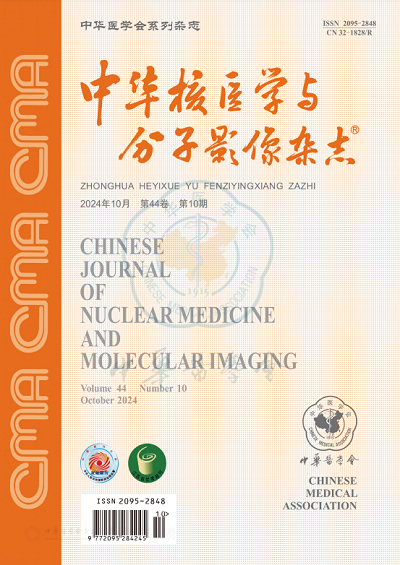Clinical value of 125I seeds implantation in the treatment of primary liver cancer with portal vein tumor thrombus
引用次数: 1
Abstract
Objective To investigate the clinical value of 125I seeds implantation in the treatment of primary liver cancer with portal vein tumor thrombus. Methods A total of 218 patients (184 males and 34 females, age: (53.8±9.2) years) with primary liver cancer with portal vein tumor thrombus between January 2015 and June 2018 were retrospectively analyzed. All patients underwent 125I seeds implantation under CT guidance. CT examination and liver function test were repeated 2-3 months after the implantation, and the portal vein tumor thrombus diameter, liver function parameters and ascites before and after treatment were compared. All patients were followed up for 2-26 months and the survival time were calculated. Paired t test was used for data analysis. Results Among 218 patients, 8 patients (3.7%) had complete remission of tumor thrombus, 111 patients (50.9%) had partial remission, 80 patients (36.7%) had no change, and 19 patients (8.7%) had disease progression 2-3 months after the implantation. The total effective rate was 91.3%(199/218). The diameter of tumor thrombus after treatment was (12.63±4.64) mm, which was significantly smaller than that before treatment ((26.65±10.88) mm; t=18.74, P 0.05). Ascites in 86/142 patients were better after the implantation. No serious complications associated with treatment were seen. There were 162 patients died and 56 patients survived till the end of follow-up. The survival time of all patients was (9.23±0.59) months. Conclusion 125I seeds implantation can safely and effectively treat the portal vein tumor thrombus in patients with primary liver cancer, and improve the clinical symptoms such as ascites. Key words: Liver neoplasms; Thrombosis; Portal vein; Brachytherapy; Iodine radioisotopes125I粒子植入治疗原发性肝癌合并门静脉肿瘤血栓的临床价值
目的探讨125I粒子植入治疗原发性肝癌门静脉癌栓的临床价值。方法回顾性分析2015年1月至2018年6月收治的原发性癌症门静脉癌栓218例(男184例,女34例,年龄(53.8±9.2)岁)患者的临床资料。所有患者均在CT引导下进行125I粒子植入术。植入后2-3个月重复CT检查和肝功能检查,比较治疗前后门静脉肿瘤血栓直径、肝功能参数和腹水情况。所有患者均进行了2-26个月的随访,并计算了生存时间。数据分析采用配对t检验。结果218例患者中,8例(3.7%)肿瘤血栓完全缓解,111例(50.9%)部分缓解,80例(36.7%)无变化,19例(8.7%)植入后2-3个月病情进展。总有效率为91.3%(199/218),治疗后瘤栓直径为(12.63±4.64)mm,明显小于治疗前的(26.65±10.88)mm;t=18.74,P<0.05)。86/142例患者术后腹水好转。未发现与治疗相关的严重并发症。随访结束时死亡162例,存活56例。所有患者的生存时间为(9.23±0.59)个月。结论125I粒子植入术能安全有效地治疗原发性肝癌门静脉癌栓,改善腹水等临床症状。关键词:肝肿瘤;血栓形成;门静脉;近距离治疗;碘放射性同位素
本文章由计算机程序翻译,如有差异,请以英文原文为准。
求助全文
约1分钟内获得全文
求助全文
来源期刊

中华核医学与分子影像杂志
核医学,分子影像
自引率
0.00%
发文量
5088
期刊介绍:
Chinese Journal of Nuclear Medicine and Molecular Imaging (CJNMMI) was established in 1981, with the name of Chinese Journal of Nuclear Medicine, and renamed in 2012. As the specialized periodical in the domain of nuclear medicine in China, the aim of Chinese Journal of Nuclear Medicine and Molecular Imaging is to develop nuclear medicine sciences, push forward nuclear medicine education and basic construction, foster qualified personnel training and academic exchanges, and popularize related knowledge and raising public awareness.
Topics of interest for Chinese Journal of Nuclear Medicine and Molecular Imaging include:
-Research and commentary on nuclear medicine and molecular imaging with significant implications for disease diagnosis and treatment
-Investigative studies of heart, brain imaging and tumor positioning
-Perspectives and reviews on research topics that discuss the implications of findings from the basic science and clinical practice of nuclear medicine and molecular imaging
- Nuclear medicine education and personnel training
- Topics of interest for nuclear medicine and molecular imaging include subject coverage diseases such as cardiovascular diseases, cancer, Alzheimer’s disease, and Parkinson’s disease, and also radionuclide therapy, radiomics, molecular probes and related translational research.
 求助内容:
求助内容: 应助结果提醒方式:
应助结果提醒方式:


